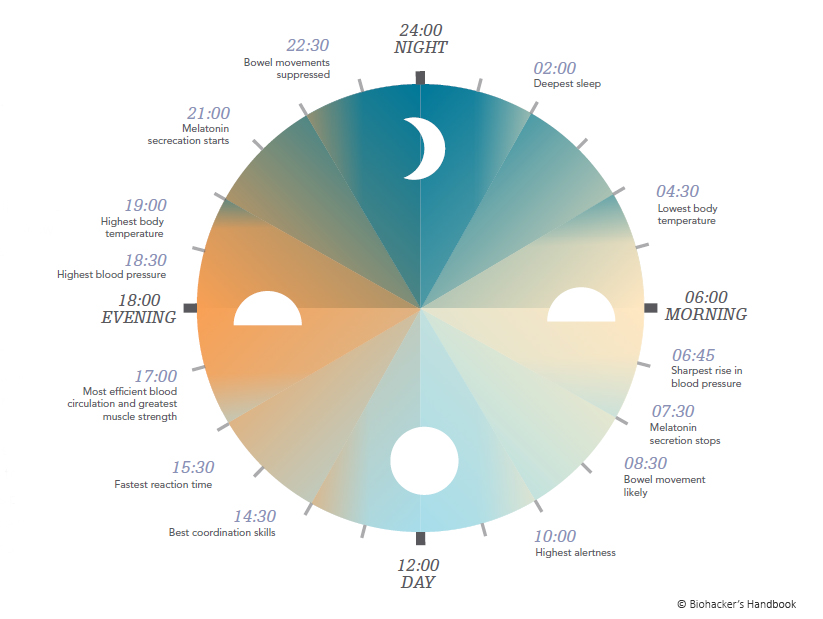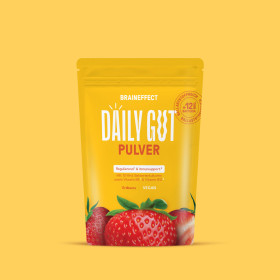
Melatonin - The sleep hormone that provides a good sleep
Sleeping is one of our natural basic needs. In this article, you will learn why good sleep is so important for your power, what melatonin is, and how you can hack your sleep quality with simple tricks.

Sleeping is one of our natural basic needs. Many try to increase their performance at the expense of adequate sleep. This is wrong because good sleep is one of the most effective levers for long-term performance and health. In this article, you will learn why good sleep is so important for your power, what melatonin is, and how you can hack your sleep quality with simple tricks. After this article, you will rise in the morning and get out of bed fully-charged, guaranteed!
Good sleep can work wonders!
You feel like sleep is an annoying waste of time and try as much as possible to cut back on it because daytime is the only time where true performance is achieved? Then think about it again: while you sleep, your body accomplishes an incredible performance. But it is no matter of remaining in bed as long as possible, rather it is about high-quality sleep. Our sleep quality can be measured, for example, concerning the REM (rapid-eye-movement) phases, as well as the amount of deep sleep. The quality determines whether you wake up full of power or overtired with bags under your eyes. Numerous studies carried out at Oxford University, provide evidence of the positive effects of adequate REM sleep for brain function, metabolism, and the immune system.¹ If you suffer from a lack of sleep, you are no longer yourself. After only 24 hours without sleep, you get up to 6% less glucose in your brain and your prefrontal cortex. This is important for thinking and decision-making processes, as well as for social interaction. If you sleep too little, your mind becomes dull and you make the wrong decisions. Meanwhile, in particular, the most important information of the day is sorted and stored and your brain is in a sense reset. Without this, you will never be able to provide full performance for the day, because good sleep is your wholly natural energy boost. The data of an American sleep tracking company showed that a lack of sleep can dramatically increase your risk of getting various diseases. For example, a lack of sleep increases cancer risk by 200% and heart disease by 100%.² Is it slowly becoming clear to you why good sleep is so important? That's good and it's going to get even better. Your sleep or melatonin, which is responsible for your sleep-wake cycle, can be easily "manipulated".
Take-Home-Message 1: Poor sleep can make you ill and confuse your metabolism. Your intellectual performance decreases and you start making bad decisions!
More Melatonin - this is how your day-night-rhythm functions
Our natural sleep rhythm is biologically evolutionary related and has not changed for 1000 years. Put simply, you sleep, because of the two hormones melatonin and cortisol alternate in your body. In the morning at about 7am the concentration of the stress hormone cortisol is highest. As an opposing force to melatonin cortisol makes you stay awake during the day and thus decreases steadily as the day passes. Then, in the evening the levels of the sleep hormone melatonin increase in the blood, which makes you tired, and therefore you are able to sleep. Human beings are governed by a built-in rhythm, which adapts to light and darkness and follows our built-in 24-hour clock. Hormones rise and fall for one reason only: they are dependent on light. This built-in 24-hour clock, also known as the "Circadian Rhythm", in addition to sleep influences the release of many other hormones to regulate your immune system, blood pressure, mental performance, and more. To move in harmony with this natural cycle is therefore extremely important, not only for a good sleep! Pay attention, now it is getting even more complex: this cycle is controlled by another hormone, the so-called happiness hormone "serotonin". Serotonin is the precursor of melatonin and thus provides a basis for the sleep hormone. At the same time, here comes the first hack for you! You can influence the amount of serotonin in your body, and thus the question of how good or bad your inner clock is running! Your Serotonin levels can be pushed upwards for example by a lot of sunlight. The latest study by the American Academy of Sleep Medicine shows that people who expose themselves to more sunshine, have seen a significant improvement in their sleep.³ The more time of the day you spend in the sun, the better you sleep at night. This cycle is also the reason for the famous "winter depression". Since we get far too little sun in winter, the level of the well-being and happiness hormone serotonin reduces. With sleep now being understood, it is time to find out what its opponent cortisol does during the day? The "stress hormone" has a reputation way too bad, but it is important for your health and your physical performance. Cortisol can in a sense be understood as the natural caffeine shot. It lets you get out of bed in the morning and makes you awake and alert.
Take-Home-Message 2: The hormones cortisol and melatonin regulate your body whether you are asleep or awake. Tip: the more sunlight you get during the day, the higher your serotonin levels and thus the production of the sleep hormone melatonin. Therefore, try to spend your lunch break outdoors, or bike to work or walk. So that way, you are on your way to a good night's sleep!

Sleep smarter - hack into your melatonin levels
We now know that melatonin is extremely important for our sleep and affects sleep quality. It decides whether you wake up fit and full of energy after sleeping or despite eight hours of sleep-wake up tired and worn out. With the following four tips, you will improve your sleep and hack into your melatonin levels.
1. Eliminate light sources
Lights out is the motto. Did you know that light receptors are stuck in your skin that send signals to your brain? Therefore, it is not enough to wear a sleep mask. The best is to be in a space as dark as possible. Studies of Harvard University have shown that the levels of melatonin in the blood can be up to 50% lower due to too much light during sleep. Definitely not recommended and certainly not relaxing! You are reading the last news in bed and watching a series on your laptop? You would do better to make sure that at least 1 hour before going to bed you are not exposed to artificial, blue light because blue light is stimulating and makes you stay awake. Another study by Harvard University showed that devices in the bedroom that emit blue light can confuse the sleep-wake rhythm and reduce the number of REM sleep phases.⁴ Blue light, in particular, inhibits the production of melatonin and promotes the production of cortisol. It makes the feeling of tiredness disappear and ensures that your sleep time needed increases. It is advisable to resort back to the good old book to help you go to sleep.
2. When and not how long
Those who want the best possible quality of sleep should try to go to bed early. The so-called "king sleep" takes place between 10pm and 2am. In this period the most beneficial release of hormones takes place. In researches, it is believed that king sleep is a natural function of nature, to adapt to the rhythm of light and dark. A study by the National Cancer Institute of Oxford University shows that, for example, nurses who regularly work at night and live in contradiction to the rhythms of nature, have a higher risk of disease.⁵ When darkness falls on the earth, we should also go to sleep according to our internal clock. Directly after falling asleep the release of the growth hormone somatropin is especially at its highest. It positively influences the regeneration of your body cells and is a natural youthful makeover. King sleep is in a sense the best anti-aging program that you can get and makes sure that you fill up your energy reserves for the next day!
3. Eat Smarter, sleep better
Food and good sleep are related because the stomach and intestines are not just there to digest your dinner. In the intestine, there are about 30 different neurotransmitters, about the same number as in the brain. Therefore, the digestive tract has also been awarded the name "The second brain". Besides its many neurotransmitters, the intestine can, above all, produce one thing: melatonin, and much more so than the brain! For optimal production of melatonin your intestines must also function well and how can you best hack into this? Through proper nutrition. Each food contains industrially produced harmful substances. The more natural and rich in vitamins, the better for the balance of your gut and therefore for your good night's sleep. Particularly good foods that contain melatonin are, for example, pistachio nuts or cherries. It is also important when they are eaten. If we eat late meals and a lot of carbs before we go to bed, insulin levels rise dramatically. A study by Sydney University shows that about 4 hours before bedtime, no large amounts of carbohydrates should be eaten, otherwise there will be an increase in sleep time and a reduction in the REM phases.⁶ If you want to ensure that your melatonin level is high enough during the night, we recommend BRAINEFFECT SLEEP. SLEEP contains melatonin which can help you to fall asleep faster. It can also help against jetlag and other changes to your biorhythm.
Take-Home-Message 3: Whether light, sports, food, or timing ...There are a huge number of ways to improve your sleep. The changes don’t necessarily need to be huge. Every little improvement, however, can ensure that your sleep quality improves step by step, which means that you can get a lot more power during the day. Give it a try and test sleep as the secret ingredient for more power and performance!
Studies
1.http://www.ncbi.nlm.nih.gov/pubmed/14715839
2.http://www.fastcodesign.com/1663126/infographic-of-the-day-so-what-if-you-dont-sleep-enough
3.http://www.forbes.com/sites/daviddisalvo/2013/06/18/to-get-more-sleep-get-more-sunlight/#53d82bf61da2 4.http://www.health.harvard.edu/staying-healthy/blue-light-has-a-dark-side
5.http://www.ncbi.nlm.nih.gov/pubmed/12783938
6. http://ajcn.nutrition.org/content/85/2/426.full



